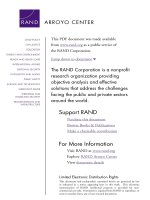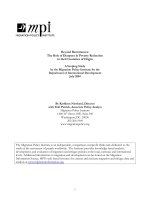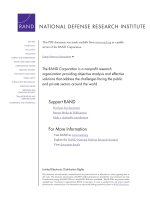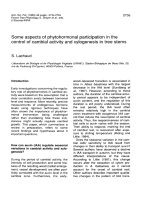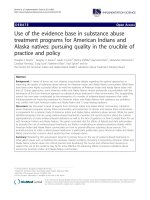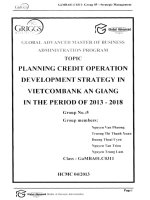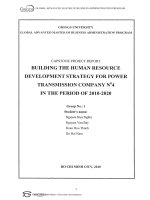- Trang chủ >>
- Cao đẳng - Đại học >>
- Luật
Novice efl teachers participation in professional development in their community of practice
Bạn đang xem bản rút gọn của tài liệu. Xem và tải ngay bản đầy đủ của tài liệu tại đây (997.73 KB, 63 trang )
VIETNAM NATIONAL UNIVERSITY, HANOI
UNIVERSITY OF LANGUAGES AND INTERNATIONAL STUDIES
FACULTY OF POST-GRADUATE STUDIES
***********************
BÙI THỊ KHÁNH HUYỀN
NOVICE EFL TEACHERS’ PARTICIPATION IN
PROFESSIONAL DEVELOPMENT IN THEIR
COMMUNITY OF PRACTICE
Sự tham gia vào hoạt động phát triển chuyên môn của giáo
viên tiếng Anh mới vào nghề tại cộng đồng thực hành
M.A. MINOR PROGRAMME THESIS
Field: English Teaching Methodology
Code: 60140111
HANOI - 2017
VIETNAM NATIONAL UNIVERSITY, HANOI
UNIVERSITY OF LANGUAGES AND INTERNATIONAL STUDIES
FACULTY OF POST-GRADUATE STUDIES
BÙI THỊ KHÁNH HUYỀN
NOVICE EFL TEACHERS’ PARTICIPATION IN
PROFESSIONAL DEVELOPMENT IN THEIR
COMMUNITY OF PRACTICE
Sự tham gia vào hoạt động phát triển chuyên môn của giáo
viên tiếng Anh mới vào nghề tại cộng đồng thực hành
M.A. MINOR PROGRAMME THESIS
Field: English Teaching Methodology
Code: 60140111
Supervisor: Assoc. Prof. Dr. Lê Văn Canh
HANOI - 2017
DECLARATION
I hereby declare that this thesis is a presentation of my original research work
submitted in partial fulfillment of the requirements for the Master of Art degree at
the Faculty of Postgraduate Studies, University of Languages and International
Studies, VNU. The material in the research has not been submitted anywhere for
any formal course assessment or any award.
Wherever contributions of other
researchers are involved, every effort is made to indicate this clearly, with due
reference to the literature, and acknowledgement of collaborative research and
discussion. The work was done under the guidance of Associated Professor Lê Văn
Canh, at the University of Languages and International Studies.
In terms of these conditions, I agree that the origin of my paper deposited in the
library should be accessible for the purposes of study and research, in accordance
with the normal conditions established by the librarian for the care, loan or
reproduction of the paper.
Hanoi, 2017
Bùi Thị Khánh Huyền
i
ACKNOWLEDGEMENTS
This thesis would not have been possible without the contributions and supports of
many people, to whom I would like to send my heartfelt thanks.
My deep gratitude goes first to my beloved lecturer and my supervisor, Dr. Lê Văn
Canh for his valuable supports and instructions. I owe a debt gratitude to his
constant advices and guidance right from the beginning of this journey. But for his
supervision, this thesis would not have been completed.
I also wishto take this opportunity to record my thankfulness to my friends and my
colleagues for their timely assistance and effective cooperation in collecting data for
completing this study. Their enthusiastic participation was indispensable to my
research.
Above all, I would like to express my heart full indebtedness to my family and
especially my husband who have always supported, encouraged and inspired me to
move on and finish the work. I‟m strongly in debited to their unconditional love and
cares. They have been always my strongest motivation to move on.
ii
ABSTRACT
The efficiency of professional development for novice EFL teachers has largely
been validated to possess intensive influence on the quality of English teaching so
far. In Vietnam, the Decision number 1400/QĐ-TTG approving the National Project
2020 by the Prime Minister Nguyen Thien Nhan (2008) has pointed out vital
purposes of teaching English as a foreign language and set a goal to shift the foreign
language as the strength of Vietnamese people. This decision has obliquely
emphasized the necessity of skillful English teachers and especially the significance
of professional development programs to train novice ones. However, the topic is
still under-investigated as too little work related to the field could be found in the
country. This study employed qualitative research approach to conduct in-depth
interviews with six Vietnamese novice EFL teachers, exploring under-surface
problems. Collected data revealed that although these teachers were thirsty for
professionalizing their major, their professional development faced not a small
number of challenges. Indeed, their self-initiated learning appeared to be more
beneficial than those training activities held at their community of practice.
iii
LIST OF ABBREVIATIONS
COP: Community of practice
EFL: English as a Foreign Language
PD: Professional development
iv
TABLE OF CONTENTS
DECLARATION ......................................................................................................... i
ACKNOWLEDGEMENTS ........................................................................................ ii
ABSTRACT ............................................................................................................... iii
LIST OF FIGURES & TABLES .............................................................................. vii
CHAPTER 1: INTRODUCTION ............................................................................... 1
1.1
Rationale ........................................................................................................ 1
1.2
Aims and objectives of the study................................................................... 2
1.3
Research questions ........................................................................................ 2
1.4
Significance of the Study............................................................................... 3
1.5
Scope of the study.......................................................................................... 3
1.6
Organization .................................................................................................. 3
CHAPTER 2: LITERATURE REVIEW .................................................................... 5
2.1
Definition of terminologies ........................................................................... 5
2.1.1
Novice teachers ....................................................................................... 5
2.1.2
Professional development (PD) .............................................................. 7
2.1.3
Community of Practice (COP) ................................................................ 9
2.2
Role of community of practice in professional development ...................... 11
2.3
Factors affecting teachers‟ participation in PD in their COP ...................... 12
2.4
Related studies on novice teachers‟ PD in their COP ................................. 14
CHAPTER 3: METHODOLOGY ............................................................................ 16
3.1
Research design ........................................................................................... 16
3.2
Selection of research participants ................................................................ 17
3.2.1
Method of sampling .............................................................................. 17
v
3.2.2
Research participants ............................................................................ 17
3.3
Data collection instruments ......................................................................... 19
3.4
Data collection procedure ............................................................................ 20
3.5
Data analysis methods ................................................................................. 21
CHAPTER 4: RESEARCH FINDINGS AND DISCUSSION ................................ 22
4.1
Access to PD activities ................................................................................ 22
4.2
Motivating factors behind novice EFL teachers‟ participation in PD ......... 28
4.2.1
Personal Characteristic ......................................................................... 29
4.2.2
Internal factors – Perceptions of PD ..................................................... 31
4.2.3
External (Environmental) factors ......................................................... 32
4.3
Contextual factors inhibiting novice teachers‟ participation in PD within
their COP ............................................................................................................... 34
CHAPTER 5: CONCLUSION .................................................................................. 38
5.1 Summary of findings and conclusion .............................................................. 38
5.2 Implications and applications .......................................................................... 41
5.3 Limitations of the research and suggestions for further study......................... 41
REFERENCES .......................................................................................................... 43
APPENDIX .................................................................................................................. I
APPENDIX 1 - Invitation Email ............................................................................ II
APPENDIX 2 - Consent form ............................................................................... IV
APPENDIX 3 - List of interview questions ........................................................... V
vi
LIST OF FIGURES& TABLES
Figure 1: Forms of professional development in language teaching .......................... 9
Figure 2: The three elements of COP ........................................................................ 10
Figure 3: Factors affecting teachers' participation in PD in their COP..................... 14
Table 1: Participants‟ backgrounds ........................................................................... 18
Table 2 Teachers' PD activities in their COP ............................................................ 23
vii
CHAPTER 1: INTRODUCTION
This chapter provides information about the research problem and the reason why
the problems need to be researched. In addition, the aims, research questions
together with scope of the study are presented. The chapter concludes with an
overview of the chapters that follow in the thesis.
1.1
Rationale
“Master teachers are not born, they become. They become
primarily by developing a habit of mind, a way of looking
critically at the work they do; by developing the courage to
recognize faults, and by struggling to improve.”
(Kane, 2004)
Recent decades, along with the rapid growth of globalization, has witnessed the
dramatic increase in the popularity of English as an International language. As an
official language of more than 67 countries and being spoken by over 840 million
people around the world, this language is regarded as the third most commonly
spoken language on this Earth, besides Mandarin Chinese and Spanish. English
words can be heard in every field, from economy, business to technology,
entertainment and a great number of cultural and social activities. In Vietnam, due
to the high requirements for communicating, studying and working, the importance
of studying English has been incredibly considered these days. The Decision
number 1400/QĐ-TTG approving the Project2020 by the Prime Minister Nguyen
Thien Nhan (2008) has pointed out vital purposes of studying English as a foreign
language and set a goal to shift the foreign language as the strength of Vietnamese
people. This decision has resulted in the necessity to enhance both the quantity and
quality of teaching English, as a student is badly in need of being exposed to
qualified teachers to be successful. More seriously, they may geton the verge of
“being set back one to three grade levels” in case they are“exposed to an ineffective
teacher” (Teacher Induction, 2008).
Therefore, comprehensibly, a large number of professional English as a foreign
language (EFL) teachers are needed to fulfill this demand. However, according to
Baggini (2005) the term “teacher professionalism” is recognized by not only
teachers‟ specialized knowledge but extent they outcome the difficulties and the
extent they are able to use their skills and experiences related to their profession as
well. This means that ralatively merely well-qualified teachers with long time
experiencing and improving in reality teaching can be master in the field. Teachers
who have just finished their studying and training in teaching field are the new
comers in their community of practice (COP) where they continue learning for their
professional development (PD). While there have been a great number of studies on
teacher learning in their communities of practice, the issue of how teachers who
have just started their career struggle to become full members of their communities
of practices in EFL contexts is not yet adequately researched. Answers to this
question are much needed in the context of the Project 2020.
So far, however, too little attention has been paid to the investigation of this topic.
This has inspired the researcher to conduct a study on the participation in PD of
Vietnamese novice EFL teachers in their COP, as well as the factors influencing
their participation.
1.2
Aims and objectives of the study
This study aims to investigate how Vietnamese novice EFL teachers experience and
participate in PD in their first years of teaching. Also, the study is proposed to find
out the contextual influences on their participation in PD activities.
1.3
1.
Research questions
To what extent do Vietnamese novice EFL teachers participate in
professional development in their community of practice?
2.
What are the motivating factors behind their participation?
3.
What challenges do they encounter in participating in their community
of practice?
2
1.4
Significance of the Study
Due to the great demand of high quality EFL teachers to fulfill the need of effective
English learning in Vietnam these days, theefficiency of PD in novice EFL teachers‟
COP should be put into proper consideration. The answers for the three research
questions in this work are supposed to explore the participation degree of
Vietnamese novice teachers in PD together with both motivated and inhibited
factors influenced the process. It can be seen as a reference for graduated
pedagogical students as well as those who are beginning initial years of teaching
career or are involved in PD. Additionally, this study is expected toassist
headmasters, principals and educationalists to propose applicable policies and PD
programs to facilitate novice EFL teachers to develop their profession right at their
COP, from which teaching output can be enhanced by converging sufficient
conditions. Besides, the research outcomes are hoped to benefit the authorities in
education and training by providing an authentic overview about the real situation of
Vietnamese novice teacher‟s PD and especially recommendations for appropriate
guidelines for teachers – to be and curriculum in teacher training institutions.
1.5
Scope of the study
This study is carried out with a purpose to have an insight on the PD that EFL
teachers experienced when they begin their new career life in COPand together with
how they perceive it. Thence, factors affecting their participation will also be
explored. Various aspects of these novice teachers‟ individual and career lives will
be investigated to find out whether they have influence on the process.
1.6
Organization
The thesis is organized into five chapters which are respectively named:
Introduction, Literature Review, Methodology, Findings & Discussions and
Conclusion.
3
First of all, an overview of the whole study including rationale, the objectives, the
settings and the scope of the study is presented in the very first chapter:
Introduction. The next chapter offers definitions of key terms together with a critical
review of theoretical literature and related studies. How the study is carried out can
be found in the following Methodology chapter with a detailed description of
participants, data collection and analysis instruments. The next section is
subsequently used to analyze the collected data, discuss the findings and propose
answers to the three research questions. Finally, the Conclusion chapter gives an
overview of the main discussed issues and draws a conclusion; points out some
limitations of the research and gives suggestions for further studies.
4
CHAPTER 2: LITERATURE
REVIEW
An overview of literature for the whole research is presented in this chapter,
including the explanation of the three key concepts “Novice teachers”, “PD” and
“COP”. Together with it, a thorough analytical review of related studies is also
provided throughout the chapter in order to identify the research gap where this
study can fit in.
2.1
Definition of terminologies
2.1.1 Novice teachers
Novice teachers can be considered certificated teachers possessing about less than
five years of teaching experience. To be more specific, Farrell (2009) provided a
definition to the term as teachers who have finished their pre-service teacher
education and have just initiated their pedagogical career in an educational
institution. Comprehensibly, the professional experiences of those teachers “are
mediated by their previous schooling experiences, the nature of the pre-service
teacher education programs from which they have graduated, and their experiences
of socialization into the educational and institutional culture”. Thus, the first years
of teaching, as stated by Kang & Cheng(2014) in their work, is doubtlessly an
essential period when “teachers test their beliefs and ideas, expand their teaching
strategies, acquire practical knowledge, and formulate their professional identity”.
Definitely, this stage is badly in need of being investigated into.
Regarding specific features of novice teachers, Bradley (2010) argued that they are
also in developmental stages, just as students are learners. The initials years of
teaching life have been recorded to emerge countless problems as well as
difficulties. A research from the Project on the Next Generation of Teachers
(Johnson, 2002)reported that new teachers “feel that they have no access to clear
answers, feel that their sense of professional competence is challenged, and
5
ultimately question their choice of teaching as a career”. Besides those pessimistic
sensation, novice teachers still lack profound understanding about “what typical
classroom activities and expected problems and solutions are like” (Berliner, 1987,
p. 72). Tsui(2003, p. 245) was successful in identifying professional limitations of
those neophytes by asserting that the main dissimilarities between novice and
experienced language teachers “seem to lie in the different ways in which they relate
to their contexts of work, and hence their conceptions and understanding of
teaching, which is developed in these contexts”. He offered a list of attributes new
teachers generally hold when beginning their job:
-
An elaborate knowledge base
-
Ability to integrate and uses different kinds of knowledge
-
Ability to make sound intuitive judgments based on past experience
-
A desire to investigate and solve a wide range of teaching problems
-
Understanding on students and students learning
-
Awareness of instructional objectives to support teaching
-
Understanding and use of language learning strategies
-
Awareness of the learning context
-
Fluidity and automaticity in teaching
Consequently, novice teachers, with a massive volume of challenges, their
deficiency and lack of experience, repeatedly notice the considerable distance
between themselves and experience teachers and realize their shortcomings in this
stage, which is a double-edged sword. It can either motivate them make efforts to
learn and improve or discourage them to engage in the chosen career. This
association of features cannot be left out as a noticeable factor influencing their later
teaching life in particular, especially their participation in PD and the quality of
education in general.
In this thesis, novice teachers are defined as those who are in their initial years of
their teaching life at a specific educational institution. To be more specific, those
teachers have 1-5 years‟ teaching experience.
6
2.1.2 Professional development (PD)
It cannot be denied that in recent decades, the subject matter of professional
development has raised great concerns in educational community and has been
clarified by various researchers. In the context that the root of poor student
achievement in many schools has been believed to be blamed on inadequate
ongoing teacher professional development, and as a result of changes in national
curriculum and tests as well as student needs, teachers are supposed to take “regular
opportunities to update their professional knowledge and skills, that is, their
favorable circumstances for PD”(Richards & Farrell, 2005, p. 7). When defining the
term PD. These two authors remind that teachers need to be able to take part in a
series of activities to develop their profession in specific goals as follows:
-
Engaging in self-reflection and evaluation
-
Developing specialized knowledge and skills about many aspects of teaching
-
Expanding their knowledge base about research, theory and issues in
teaching
-
Taking on new roles and responsibilities, such as supervisor or mentor
teacher, teacher-researcher, or materials writer
-
Developing collaborative with other teachers.”
In another report, a different concept of PD was referred as "opportunities to
develop new knowledge, skills, approaches, and dispositions to improve their
effectiveness in their classrooms" ((Loucks-Horsley, 1998, p. xiv). Also, Horn
(2004) shared the same viewpoint like the authors above by bringing out a further
discussion to the term as “a broad range of processes and activities that contribute to
the learning of educators”. To make it more specific, Killion (2002) identified PD as
centralized systems supporting the development of knowledge, skills, attitudes,
aspirations, and behaviors leading to the improvement of student accomplishment.
This identification is supported by the synthesis written two years before by Guskey
7
who recognized PD as a systematic process “enhancing teacher effectiveness by
focusing on teacher knowledge, skills, and attitudes”. It is apparent to see that no
matter which way these researchers offer their definitions of “PD”, their arguments
stood on the same side. The noticeable importance of PD was admitted and
emphasized by all of them, especially the influence of it on students‟ improvement.
PD “should be about shaping teachers‟ knowledge, beliefs, and attitudes, and
success should be determined by student outcomes” (Kubitsky & Fishman,
2007).PD generally serves “activities for teacher to achieve a longer-term goal and
seeks to facilitate growth of teacher‟s understanding and of themselves as teachers.”
(Horn, 2004).
In terms of PD specific activities, investigations into traditional PD have pointed out
several ways to formalize the process such as such as professional meetings,
conferences, seminars, presentations, workshops, and mentoring(Porter, 2002).Later
on, the reading of professional publications and discussions of professional issues
with colleagues within formal and informal structures were asserted by
Knight(2002). Additionally, Glatthorn(1995) recognized the value of teacher
discussions and interactions as fundamental to the improvement of teacher quality.
DuFour, Eaker, & DuFour (2005) impressed the necessary of collaborative
interactions within quality professional development structures. Also in that year, a
series of tasks aggregated from results of previous studies was provided by Richards
and Farrell in their work Professional Development for Language Teachers. In
short, advantageous schemes to assist the progress of PD are listed in the following
figure:
8
Figure 1: Forms of professional development in language teaching
Forms of professional development in language teaching
-
Workshops
- Journal writing
- Self – reflection
-
Self- monitoring
- Peer observation
- Team teaching
-
Teacher support groups
- Teaching portfolios
- Action research
-
Professional meetings
- Presentations
- Conferences
-
the reading of
- Peer coaching
- Seminars
professional materials
-
Analysis & discussion of
- Case analysis
critical incidents
-
(Richards & Farrell, 2005, p. 4)
2.1.3 Community of Practice (COP)
As proposed by DuFour(2004), the term “COP” is used to describe every
imaginable combination of individuals with an interest in education including grade
level teams, school committees, departments, school districts, state departments of
education, and national professional organizations. In other words, it is a group of
practitioners "who share a concern, a set of problems, or a passion about a topic, and
who deepen their knowledge and expertise in this area by interacting on an ongoing
basis" (Wenger, McDermott, & Snyder, Cultivating communities of practice, 2002,
p. 4). The concept is analyzed by those three scientists to consist of three basic
components, which are described in the following figure:
9
Figure 2: The three elements of COP
(Wenger, McDermott, & Snyder, 2002, p. 4)
• The domain creates common ground and a sense of common identity. “A welldefined domain legitimizes the community by affirming its purpose and value to
members and other stakeholders”. It brings inspiration to people to “contribute and
participate, guides their learning, and gives meaning to their actions”. Thus, it is
always advisable for teachers in COP to deeply understand the domain. Perceiving
the boundaries and the leading edge of the domain empower “members to decide
exactly what is worth sharing, how to present their ideas, and which activities to
pursue. It allows them to recognize the potential in tentative or half-baked ideas”.
• The community creates “the social fabric of learning”. It is an essential element
because “learning is a matter of belonging as well as an intellectual process,
involving the heart as well as the head”. Interactions “based on mutual respects and
trust” can be fostered in a strong community. An eagerness to share ideas, expose
one's ignorance, ask difficult questions or listen carefully is encouraged in this place
as well.
• The practice is a set of frameworks, ideas, tools, information, styles, language,
stories, and documents that community members share. (pp. 27-29)
10
2.2
Role of community of practice in professional development
Wenger‟s(1998) perspective in his work pointed out that “learning as social
participation' where one is an "active participant in the practices of social
communities and constructing identities in relation to these communities" which
"shapes not only what we do, but also who we are and how we interpret what we
do" (p. 4). This means that learning involves participation in a COP. It is impossible
for a successful PD to neglect the contribution of COP, especially PD programs for
novice teacher. In a study on teachers‟ first-year experiences, Richards &
Pennington (1998) proved this importance by finding that the teaching context have
played an influential role in determining novice teachers‟ classroom practices.
The explanation for the indispensable roles of COP is that most conventional
explanations of learning have failed to view its social character. Learning should be
regarded as a process by which a learner internalizes knowledge, whether
'discovered,' 'transmitted' from others, or 'experienced in interaction' with others"
(Lave & Wenger, 1991, p. 47)Professional learning is a story of participation in
communities rather than “the reception of factual knowledge information”. That
expounds why COP is absolutely necessary in the learning of novice teachers, those
who acquire a great deal of pedagogical learning theories but meet few opportunities
to practice in real classroom.
Concerning the assistance of COP, Wood (2007) highlighted that attendance in COP
enables teachers to “accept primary responsibility for their growth in expertise by
equipping them with fundamental strategies to build on their own knowledge”. This
professional development allows teachers to “respond effectively to student needs”
(2007, p. 710). Results of a survey in his investigation suggested that there was
“increased trust among professional colleagues, a better understanding of how to
meet student needs, a district climate more conducive to risk taking and innovation,
and a greater sense of professional efficacy to improve student learning” (Wood,
11
2007, p. 717). A COP can be definitely used as a framework for understanding and
promoting teacher learning and as a particular theoretical approach to professional
development, where teacher learning is promoted, supported and sustained. It could
be a hidden invaluable structure in schools if cultivated actively and systematically.
However, is COP beneficial for novice teacher‟s participation in PD in the context
of education in Vietnam indeed? In this study, the thoughtful awareness of COP will
be used as a theoretical framework for understanding novice teacher‟s participation
degree in PD and influential factors hiding behind it.
2.3 Factors affecting teachers’ participation in PD in their
COP
As a vital element creating successful PD, teachers‟ participation in PD in their COP
has been greatly concerned by researchers all around the world. Long time ago, in
the work of Theory of Reasoned Action, Fishbein & Ajzen (1975) mentioned the
influence of psychological and sociological perspective on teachers‟ attendance.
Becker & Gibson (1998) later on re-categorized those factors into individual and
societal determinants respectively including personal attitudes and social pressures.
“Both the individual and the desires of others are important to the individual and
play a part in motivating individuals” (p.7) Rubenson (1977) gave further
clarification of the two influential groups by adding the interactions of a variety of
personal variables such as previous experience, personal attributes, and needs and
environmental variables. In his paper, a hierarchical structure, norms and values of
significant others, and available educational possibilities were mentioned as
environmental elements affecting the participation of adults. In the year of 1982,
Darkenwald & Merriam who focused on sociological perspective shown out that of
all the factors, socioeconomic status factors are the most powerful one for adult
participatory behavior. Besides, learning press was suggested in their report as an
encouragement or requirement for further learning in teachers‟ environment.
12
Recently, in the 21st century, influential factors founded in those theories were
reorganized and generalized by modern researchers. Seven founded factors were redivided into two groups, the internal (individual) and external (environmental) ones.
Teachers’ attitudes toward professional development activities and teachers’ selfefficacy were listed in the first group while time including: work-time, personal,
leisure-time, and family-time, funding (supplementary salary for instance), principal
influence (principal’s support, encouragement and facilitation), colleague influence,
and school culture (working environment) were proposed to be in external teams by
many researchers like Bayindir (2009), Fullan (1995) and Torff & Sessions (2008).
In addition to these factors, the third set of influential elements called “personal
characteristics of teachers” has been identified and adjoined by some research. Ozer
& Beycioglu (2010) after several experiments has concluded that female teachers
have more positive attitudes toward PD activities than male teachers and
experienced teachers generally have negative attitudes about PD activities.
According to the authors, teachers’ age, years of teaching experience, the level of
educational attainment and the grade level in which they teach influence their
participation degree PD activities.
In the circumstance that there exists no single model reasoning teachers‟
participation in PD(Becker & Gibson, 1998), this study adapts a theoretical
framework which synthesizes all previous theories about determinants of teachers‟
attendance in PD relatively sufficiently by Bayar (2013). The theoretical framework
is illustrated in the figure bellow.
13
Figure 3 Factors affecting teachers' participation in PD in their COP
(Bayar, 2013, p. 39)
2.4
Related studies on novice teachers’ PD in their COP
Needless to say, massive investigations in the area of EFL novice teachers‟ issue
have been found in literature from everywhere around this world. Most of them
concerns about the working lives, experiences, motivations, believes, difficulties
and the autonomy of the subjects. Several works of Farrokhi, Rahimpour, & Papi
(2011) in Iran,Kang & Cheng (2014) in China, Kumazawa (2011) in Japan, Pineda
& Frodden (2008) in Colombia, Dellar (1990) in Morocco, and Akbulut (2007) in
Turkishcould be listed out as successful instances. Most of them employ qualitative
approach, in-depth interview or case studies to be more specific, to explore the
targeted affair. It is not a complicated work to realize that this appropiate selection
14
of researching method has made great contribution to the success of those projects
in the field.
In addition, due to the popularity of it in education, professional development has
become an interest of various researchers. Besides some efforts to conceptualize
PD, a large amount of aspects around PD have been focused on. Not only did
several researchers as Vail, (2011), Brown (2010),Alozie (2010), and Hinds(2007)
concern about both influential factors and, efficiency and values of a quality PD but
some other studies also paid attention to specifically analyze the relationship
between PD and teachers‟ feature, COP, the principal, educational policies such
asBayar (2013)and Gray (2011). These works were conducted with a purpose to
provides benificial suggestions and reccomendations to make progress and enhance
the effectiveness of PD in their targeted pedagogical context.
Nevertheless, little have known about how novice teachers perceive PD in their
COP as well as the extent they participate in it, especially in Vietnam. Those papers,
both about novice teacher and PD, only concentrate on their specific local area.
Distictive analyzation of teacher‟s participation in PD in Vietnam is still under–
investigation. As a results, studies on influential factors of the effectiveness of PD
for novice teachers in specific COP have not been deeply concerned, although the
importance of it has been perceived by Vietnamese educationalists for a long time.
Moreover, reccomendations and guidelines for novice EFL teachers when initating
their career are rarely put into consideration. In fact, there are some Vietnamese
studies in this area. However, they just focused on the quality of PD or merely the
individuals motivation in developing their profession like in Huyền‟s paper (2014),
environmental influences on individuals‟ attendence in PD are nearly neglected.
Therefore, this study is expected to fill in this research gap when paying attention to
all possible influential factors of EFL novice teachers‟ participation in PD in typical
COP in Vietnam. Learning from the success of several mentioned previous studies
inthe areas, qualitative approach together, specifically in-depth face to face
interview,was employed again in this study.
15
CHAPTER 3: METHODOLOGY
The chapter presents the methods used for the data collection and data analysis in
the study. It starts with an explanation of the participant recruitment criteria and a
description of the participants. Also, data collection instruments and procedure
together with data analysis method are described.
3.1
Research design
As the research aim to investigate how Vietnamese EFL teachers participate in PD
in their COP as well as under-surfaced factors influencing their grade of
participation, qualitative methodology is adopted in this study with the hope to
collect the most reliable data. This choice can be explained by the effectiveness in
obtaining culturally specific information about the values, opinions, emotions,
behaviors, and social contexts and especially in identifying intangible factors of
particular populations of qualitative research (Qualitative Research Methods
Overview). According to Willig(2001), qualitative research is usually concerned
with meaning, and “in particular how people make sense of the world and how
participants experience events from their perspectives” (p.26). Griffin (1986)
additionally explained that the methodology had power to enable researchers to
make connections between different aspects of people‟s life including domestic
sphere, employment and leisure time, which is considerably beneficial in this work.
Moreover, research results reported from recent related studies by scientists all
around the world such as “The development of novice teacher‟s autonomy” by
Pineda & Frodden (2008) in Colombia, “A comparison between expert and novice
teachers” by Farrokhi, Rahimpour, & Papi (2011) in Iran,“Working lives and
motivation of secondary school teachers” by Kumazawa (2011) in Japanor “Teacher
learning in the workplace” by Kang & Cheng (2014) in China has proved this
undeniable efficiency of qualitative approach in the field. Thus, it was decided that
16
